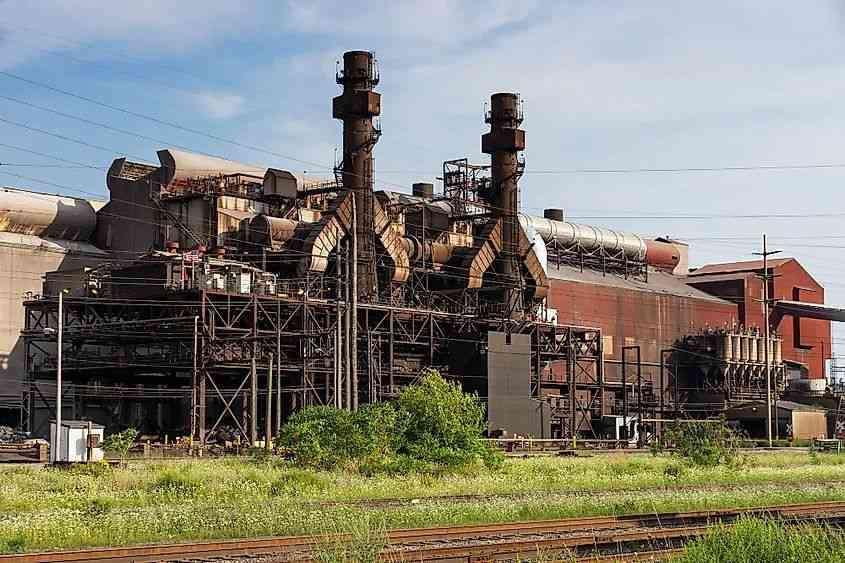
REGARDLESS of who wins the United States election this week, it is already clear who the loser is: the neoliberal belief that free trade is universally a good thing.
Donald Trump's influence on trade policy has been undeniable. In perhaps the most divided Congress in American history, one of the few topics on which there is bipartisan agreement is the need for less free trade.
The only distinction between Red and Blue is the extent.
Arguably, this is all down to Trump. His relentless rants on the topic polluted the discourse and shifted the consensus about trade across the political spectrum.
Now those extolling the benefits of free global markets are the fringe.
Even acolytes of Bidenomics advocate tariffs and subsidies. The magnitude of this shift is remarkable.
Not long ago, there was near-universal agreement on the need for open markets. The World Trade Organisation (WTO) was established to consign tariffs to the dustbin of failed policies, alongside the gold standard and communism.
Back then, Ricardian theories of comparative advantage — the notion that free trade benefits all societies — were considered undeniable. China’s admission to the WTO in 2001 was the high point of this orthodoxy.
- Letter from America: Is former president Donald Trump a hero or villain?
- Chidzivo, Tarakinyu clinch Kabag honours
- Letter from America: Is former president Donald Trump a hero or villain?
- The Fiddler: Is honesty the best policy?
Keep Reading
But all this perhaps overstates the topic. Before Trump, trade was not really a topic of consequence.
Outside of the fringe anarchists protesting at the WTO conferences of Seattle and Genoa, or ivory towers of universities and free market think-tanks, people just did not really care.
It was the preserve of weirdo lefties and policy wonks.
For everyone else, the world of tariffs, subsidies and non-tariff barriers was simply too dull to matter. When did it all change?
Trump changed all this.
I recall clearly in 2016, while he was on the campaign trail, listening to yet another of his long-winded diatribes on the evil of free trade, and thinking, why does he care?
And why does he think anyone else does?
The fact that a populist should make such an arcane topic the centrepiece of his election campaign — alongside immigration — seemed ludicrous.
However, more dedicated Trump followers would not have been surprised or confused. Numerous videos on YouTube from the 1980s show a measured, even soft-spoken Trump until trade is mentioned.
Then his obsession with the topic is clear, with Japan as his main target at the time (“They laugh at us… because of our own stupidity”).
Throughout his more than 40 years in the public eye, he has consistently maintained that trade – and economics more generally – is a zero-sum game. Running a current account deficit with another country equates to “losing” to it. We may scoff at the simplicity of his economic views, but we cannot deny his success in influencing public opinion. Perhaps this is too simplistic. Maybe Trump is merely a product of the post-financial crisis upwelling of frustration with globalisation.
If it had not been Trump, some other trade denialist fringe figure would have broken into the mainstream.
But this is a moot point.
The Damascene conversion of the Washington establishment (and indeed many in Europe and beyond) on free trade matters. For example, since 2000, South Africa has benefited from the African Growth and Opportunity Act (Agoa), a typical pre-Trump piece of US legislation designed to strengthen relations with Africa through trade. Agoa provides trade preferences for certain goods, allowing South Africa to export everything from citrus and platinum to fully finished BMWs to the US with lower duties.
In 2023, South Africa exported goods worth R260 billion (US$14,7 billion) to the US, about 25% of which enjoyed lower tariffs under Agoa.
Agoa is set to expire in 2025. While it is likely that a Harris administration would extend it and keep South Africa eligible, it is certainly not guaranteed.
Meanwhile, Trump is almost certain to scrap it, having proposed a blanket 10% tariff on all imports, regardless of origin. As South Africa is the largest African exporter to the US under Agoa, losing these benefits could jeopardise about 13 000 jobs, mostly in mining, agriculture and manufacturing.
The economics of trade is clear.
One can argue about the effects of free trade, the comparative winners and losers. We can lament the plight of those poor folk of the Rust Belt in Pennsylvania, mourning the demise of their coal and steel industries after they were outsourced to Chongqing.
But the net effect of trade barriers is slower growth, lower productivity and less wealth creation.
Maybe less trade would result in lower inequality, but even that is dubious. And in any event, such a claim made by the Trumpian right is ironically the same line of thinking as the redistributive calls for less growth made by the left; that growth is not always a good thing, that a rising tide does not lift all boats, that the outcomes of growth are societally suboptimal.
Economic historians may well look back on 2016 as the last time there was universal agreement on free trade. We are all, to some degree or another, Trumpian now.
America is slowly but inexorably sliding back into splendid isolation.
We can only watch in amazement at the economic stupidity of it all and wish them well. — Daily Maverick
- Labia writes on the economy and finance. Partner and chief economist of a global investment firm, he writes in his personal capacity. MBA from Università Bocconi. Supports Juventus. NB: Trump was declared winner this week.











